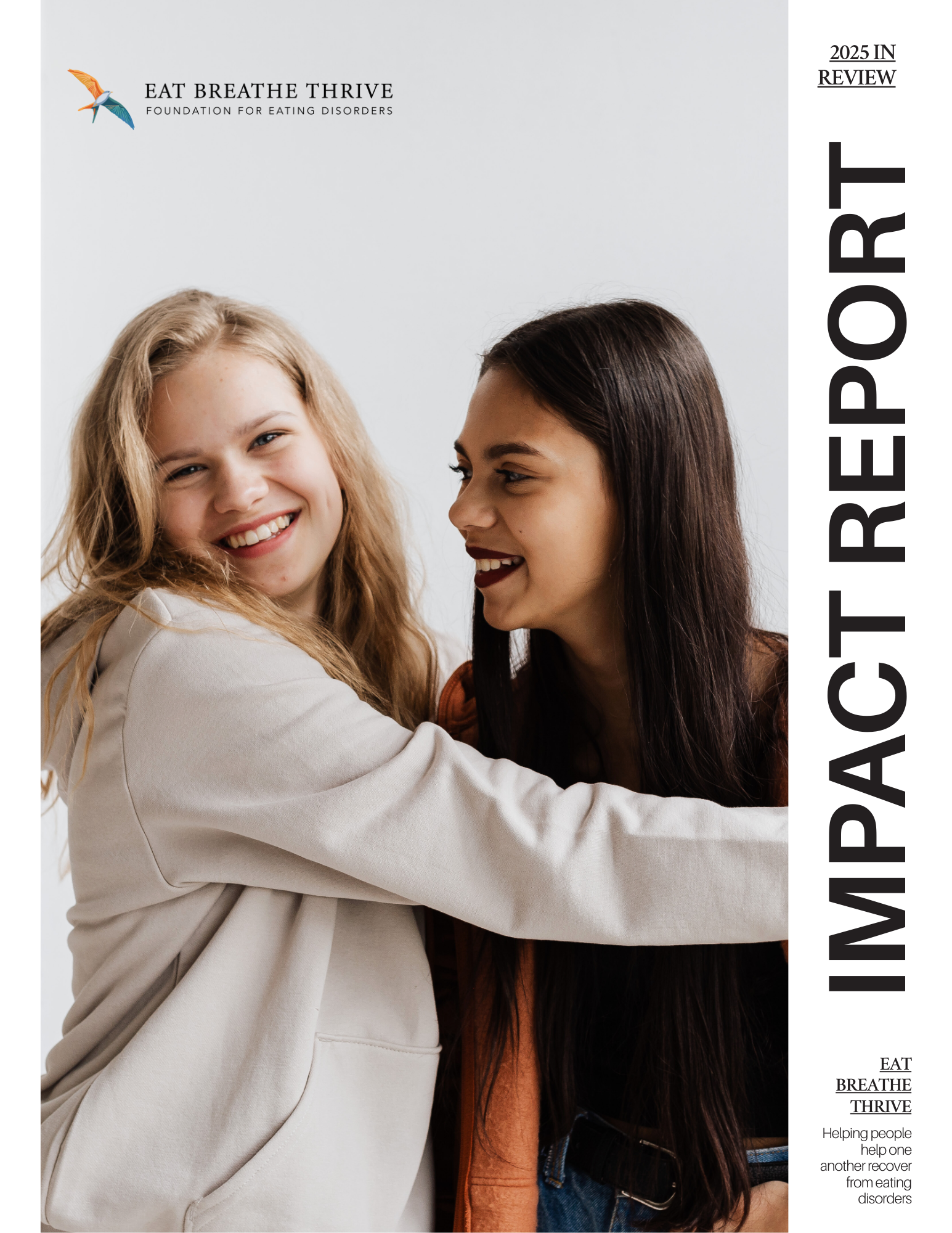Eat Breathe Thrive Blog
Our Annual Report highlights some of our most memorable moments — from inspiring stories and eye-opening statistics, to snapshots of our team and courses in action.
Recovery is not meant to happen alone. For many, like our incredible volunteer Evie Mills, community and service are essential parts of eating disorder recovery. Learn how community connection, purpose, and peer support can help make a huge difference in eating disorder recovery.
What is embodiment, and where did the idea come from? What does embodiment have to do with eating disorders? And how has the work of Dr. Catherine Cook-Cottone and Dr. Niva Piran led to what we know about the power of embodiment in recovery?
What is polyvagal theory, and why does it matter for eating disorders and recovery? Developed by neuroscientist Stephen Porges, this groundbreaking theory explains how our nervous system shapes the way we feel, connect, and cope. In this post, we explore how polyvagal theory offers a new way of understanding eating disorders and mental health, and how body-based practices like yoga can support healing and regulation.
Cori Williams shares her inspiring journey through eating disorder recovery. Learn how signs of an eating disorder began in puberty and how yoga became her path to healing.
What is a severe and enduring eating disorder? This article explains the meaning of SEED and SE-AN, and the rise of “terminal anorexia,” and what the evidence really says about treatment and recovery.
What is distress tolerance, and what is it’s role in DBT? Why overcontrolled individuals may need a different approach. Explore distress tolerance skills and RO DBT strategies to enhance emotional resilience and connection.
In this powerful and thought-provoking episode, Chelsea Roff discusses the Assisted Dying Bill before Parliament and its potential implications for individuals with eating disorders.
Today, we joined leading charities and advocates across the UK in calling for greater protections for people with eating disorders.
Our Annual Report highlights some of our most memorable moments — from inspiring stories and eye-opening statistics, to snapshots of our team and programs in action.
A groundbreaking study finds an innovative intervention can significantly improve outcomes in those who have lived with eating disorders for more than a decade.
Marsha Linehan changed the world when created DBT. Did you know this life-changing therapy was born from her own experience of mental illness?
A groundbreaking study published today in Frontiers in Psychiatry reveals at least sixty patients with eating disorders have been euthanized or assited in suicide by their physicians.
Chelsea Roff shares how weight stigma is hindering access to eating disorder treatment and offers ways to support someone with an eating disorder.
Kevin shares their lived experience with mental health, an eating disorder, and the journey to recovery.
While there are many different experiences of recovery, one underlying message is clear: We do recover. Recovery is possible.
Our Founder, Chelsea Roff, speaks out about the dangerous consequences of a newly proposed diagnosis that some physicians are using to help people with anorexia to end their own lives through Physician-Assisted Suicide.
Diet culture consists of a set of societal beliefs and expectations around food and weight. The media and society constantly reinforce diet culture and establish stereotypes that promote specific body types and weights.
Uncover the connection between social media and eating disorders. Find strategies to manage its effects, promote body positivity, and foster recovery.
Chelsea Roff, Founding Director of Eat Breathe Thrive, reflects on this year’s Yoga and Recovery Symposium and what it means to focus not only on treatment but prevention.
Daneen Farrall takes us on Part II of her path to becoming an EBT Facilitator, integrating resilience and intention into her own healing journey.
Chelsea Roff reflects on her recent conversation with Conspirtuality Pod cast about orthorexia and gendered eating disorder stereotypes. She reflects on the meaning of the popular term “orthorexia,” the problems with overdiagnosis in psychiatric care, and the unique ways eating disorders present among men.
Eat Breathe Thrive Facilitator Alyssa Gremban shares her story of twenty-two years and thirteen hospitalizations battling an eating disorder and how Eat Breathe Thrive helped her turn on a recovery “light bulb” she didn’t even know existed.































Trauma changes how the body responds to food, stress, and nearly every facet of life. For people with eating disorders, recovery often involves learning to work with the body as an ally, not just change thoughts and behaviour.